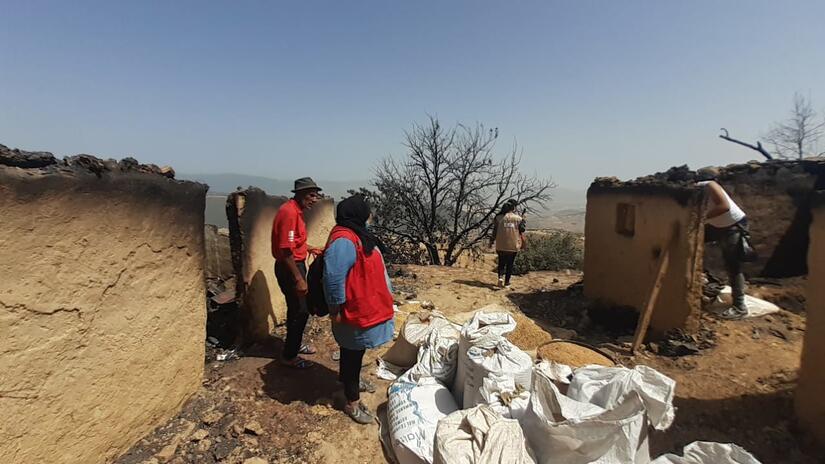Algeria/Tunisia/Beirut, 13 August 2021 – The wildfires currently spreading in Algeria and Tunisia threaten the lives of tens of thousands, while also damaging local ecosystems, infrastructures and livelihoods. Both countries face a multi-hazard situation, as an alarming number of COVID-19 infections have been reported in the past weeks.
Flames have killed dozens of people and forced hundreds of families to leave their homes. Hundreds of people have lost their houses, farms and livelihoods. Thousands of hectares of land have been burned down.
Red Crescent volunteers and staff have been supporting communities by providing first aid, psychosocial support, emergency shelter, drinking water and other necessary relief items. For example, the Algerian Red Crescent has already set up 200 tents for emergency shelter and supported shelter solutions in host communities for an additional 8,000 families.
Anne E. Leclerc, Head of the North Africa Country Cluster Delegation for the International Federation of Red Cross and Red Crescent Societies (IFRC) said:
”Most of the northern parts of Tunisia and Algeria have already been severely impacted by multiple fires. Extreme weather conditions intensify the risk of additional fires in the region. The Red Crescent Societies of Tunisia, Algeria and Morocco are on high alert, mobilizing volunteers and providing assistance to affected communities in close coordination with local authorities.
"Climate change is here. It impacts people across the globe every day. Combined with the recent surge of COVID-19 cases in the region, we are tackling multiple crises simultaneously. The combination of these is stretching already strained healthcare systems to their limits.”
In Algeria, the fires have been raging since Monday and are spreading to new areas. So far, the Algerian Red Crescent has mobilized more than 300 volunteers to the response operation. IFRC is releasing financial resources from its Disaster Relief Emergency Fund (DREF) to support the response operation and is planning together with the Algerian Red Crescent for a possible request for more international support.
Dr. Saida BenHabyles, the President of Algerian Red Crescent said:
“The momentum of national solidarity, initiated since the start of the COVID-19 pandemic, has been reinforced during this wave of multiple fires that struck parts of the country. The Algerian Red Crescent, one of the links in this great chain of solidarity, has been working tirelessly on the ground since the start of the pandemic and since the first hours of the outbreak of the fires. This disaster comes with another great danger, the COVID 19 pandemic. We are facing a double challenge when working against the spread of the COVID-19 and providing assistance to those affected by the fires.”
In Tunisia, more than 100 families have already lost their homes as the fires have been spreading to new areas. The Tunisian Red Crescent is providing affected families with emergency shelter, household items, as well as psychosocial support. The IFRC has released 99,897 Swiss francs from its Disaster Relief Emergency Fund (DREF) to support the fire response by the Tunisian Red Crescent.
In addition, the IFRC supports the coordination of both response operations as well as monitors the heatwave patterns and real-time wildfire alerts across the region, disseminating early warnings and calls to action to the affected countries.
Algeria and Tunisia have been witnessing an increasing number of wildfires. The fires are linked to climate change, which is causing more extreme weather conditions, such as scorching temperatures and less rainfall.
Notes to Editors
Algeria:
- The IFRC is working with the Algerian Red Crescentto release initial financial support from the Disaster Relief Emergency Fund (DREF) to support the wildfire response in Algeria. Ongoing operational planning is also ongoing for a possible request for more international support.
- In the past weeks, we have seen a sharp increase in COVID-19 infections. In response to the latest peak, the Algerian Red Crescent (ARCS) has scaled up its COVID-19 activities. More than two million people have already been vaccinated by ARCS doctors and nurses both in cities and in remote areas. Many new vaccination centres have recently been set up to reach the national target set by authorities to have 20 million people vaccinated by the end of 2021.
Tunisia:
- The IFRC has released 99,897 Swiss francs from its Disaster Relief Emergency Fund (DREF) to support the fire response by the Tunisian Red Crescent.
- The wildfires have particularly affected the governorates of El Kef, Jendouba, and Kasserine. Communities urgently need emergency shelter, safe drinking water, livelihoods support and health care.
- The first phase of support will be targeted especially for the families that have lost their homes or source of income, women-headed households, families which have members with special needs including disabilities, the elderly, lactating and pregnant women, and children under five.
- In the past weeks, Tunisia has registered the highest number of daily COVID-19 deaths since the start of the pandemic as the Delta variant of the coronavirus is spreading and vaccine availability remains low. The health care system is struggling to cope and intensive care capacities are inadequate. Tunisia has one of the highest per capita COVID-19 death rates in the world.
DREF
- The IFRC’s Disaster Relief Emergency Fund (DREF) is a pooled fund that allows for flexible and urgent disbursing of funds in acute emergencies or for anticipatory action.
- Any time a Red Cross or Red Crescent National Society needs immediate financial support to respond to a disaster, it can request funds from the DREF. Funds can be requested for small and medium-scale disasters, or to provide initial funding before emergency appeals are launched for large-scale operations. The IFRC allocates grants from the Fund, which can then be replenished by the donors.
- Contributions for donors to replenish DREF are very welcome, to enable local actors to act swiftly in support of vulnerable people on the ground, before larger funding arrives.
Audio-visual materials:
What to do before, during and after wildfire EN | AR | FR
News bulletin video





